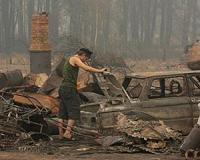| . |  |
. |
Cancun, Mexico (AFP) Nov 28, 2010 Familiar battle lines emerged on Sunday on the eve of a conference to restore the credibility of the UN's talks on climate change after last year's near-disaster in Copenhagen. Campaigners said the interests of the environment and poor countries would not be sacrificed to help boost the faltering process, while the European Union (EU) called on China, the United States and India to agree to "fair" curbs on their carbon emissions. Nearly 200 countries will take part in the 12-day conference in the Mexican resort of Cancun. It aims at healing the wounds of the December 2009 UN summit in Copenhagen, where more than 120 leaders failed spectacularly to deliver the promise of a post-2012 pact to roll back climate change. Instead of grappling for an overarching treaty, negotiators are being asked to notch up progress on half a dozen issues to help revive faith in the UN climate arena. The European Union's chief negotiator, Artur Runge-Metzger, said there was "no guarantee" the talks under the UN Framework Convention on Climate Change (UNFCCC) would follow this new, pragmatic, incremental path. "But what I can hear very clearly over the last weeks and months (is) that all parties want to make headway here in Cancun," he told a press conference. "They want to show the world that this process can deliver, it can move the international climate agenda forward." Runge-Metzger warned: "If we are not able to do that, then we would really have to reconsider if this process is a process that can address this very important question for humanity in this century." The EU looked to China and the United States -- the world's No. 1 and 2 carbon emitters -- as well as India to make "firm commitments to do their fair share of reducing global emissions," he said. Activists fighting for tough curbs on greenhouse-gas emissions warned they would fight against a sellout in Cancun, while Bolivia said it suspected a backdoor attempt to enshrine the troubled outcome of Copenhagen in negotiating texts. It took aim at the so-called Copenhagen Accord, a face-saving compromise document assembled by a couple of dozen leaders in the final hours of last year's summit but never accepted by a UNFCCC plenary session. "Cancun should not be the Copenhagen Accord, Part II," the Bolivian delegation said in a statement. The deal sets a goal of limiting global warming to two degrees Celsius (3.6 degrees Fahrenheit), but does not identify the stepping stones to achieving this -- and the promises to curb greenhouse gases, the toughest issue of all, are only voluntary. Issues where the Cancun talks could make progress include measures to avert deforestation in tropical countries, which accounts for between 12 and 25 percent of global emissions of greenhouse gases. Countries could also give the formal go-ahead to a so-called Green Fund serving as the main vehicle for providing up to 100 billion dollars a year in aid to poor countries by 2020. That money is part of the Copenhagen Accord, along with 30 billion dollars earmarked as "fast-start" help in 2010, 2011 and 2012. Still unclear is how much "fast-start" money is being allotted to help reduce emissions and how much to help poor countries adapt to its impacts. Poor countries are least to blame for the fossil-fuel pollution that causes global warming, yet are most exposed to the worsening drought, flood, storms and rising sea levels that will result. "Only three billion dollars has been formally allocated for adaptation," said Saleemul Huq of the International Institute for Environment and Development (IIED). "There is also a danger that some of this could come in the form of loans which would further in debt already poor nations and force them to pay to fix a problem that the developed nations created."
Share This Article With Planet Earth
Related Links Climate Science News - Modeling, Mitigation Adaptation
 Horror summer fails to shift Russia climate scepticism
Horror summer fails to shift Russia climate scepticismMoscow (AFP) Nov 27, 2010 Russia may have endured its hottest summer on record and battled deadly forest fires, but attitudes on climate change remain dominated by scepticism and even mired in conspiracy theories. Experts see no major substantial movement in Russia's stance ahead of the latest UN climate conference in Cancun, despite the occasional acknowledgment by President Dmitry Medvedev that the earth is warming ... read more |
|
| The content herein, unless otherwise known to be public domain, are Copyright 1995-2010 - SpaceDaily. AFP and UPI Wire Stories are copyright Agence France-Presse and United Press International. ESA Portal Reports are copyright European Space Agency. All NASA sourced material is public domain. Additional copyrights may apply in whole or part to other bona fide parties. Advertising does not imply endorsement,agreement or approval of any opinions, statements or information provided by SpaceDaily on any Web page published or hosted by SpaceDaily. Privacy Statement |